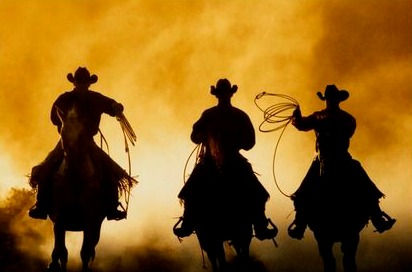The American Cowboy
- http://www.legendsofamerica.com/
- 23 de ago. de 2016
- 3 min de leitura

In the mid 19th Century the American cowboy occupied a place sufficiently important to entitle him to a considerable share of public attention. His occupation was unique. In the exercise of his function he was always a man on horseback. His duty as a worker in the cattle business was, at times, to ride over the range in order to see that straying cattle did not rove too far from the assigned limits; at times to drive the herd from one locality to another; and at times, to round up the dispersed cattle, by which is meant to collect them together for the purpose of branding calves, or of selecting beef cattle, which latter were driven to railroad stations for shipment to market. The chief qualifications of efficiency in this calling are courage, physical alertness, ability to endure exposure and fatigue, horsemanship, and skill in the use of the lariat. The original cowboy of this country was essentially a creature of circumstance, and mainly a product of western and southwestern Texas. Armed to the teeth, booted and spurred, long-haired, and covered with the broad brimmed sombrero the distinctive badge of his calling, his personal appearance proclaimed the sort of man he was. The Texas cowboys were frontiersmen, accustomed from their earliest childhood to the alarms and the struggles incident to forays of Indians of the most ferocious and warlike nature. The section of the State in which they lived was also for many years exposed to incursions of bandits from Mexico, who came with predatory intent upon the herds and the homes of the people of Texas. The carrying of firearms and other deadly weapons was consequently a prevalent custom among them. And being scattered over vast areas, and beyond the efficient protection and restraints of civil law, they of necessity became a law unto themselves.
It is not a strange thing that such an occupation and such environment should have developed a class of men whom persons accustomed to the usages of cultivated society would characterize as ruffians of the most pronounced type. But among the better disposed of the Texas cowboys, who constitute, it is believed, much more than a majority of them, there were true and trusty men, in whom the dangers and fortunes of their lives developed generous and heroic traits of character. The same experiences, however, led the viciously inclined to give free vent to the worst passions. Upon slight provocation they would shoot down a fellow man with almost as little compunction as they fired upon the wild beasts. But the peculiar characteristics of the Texas cowboys qualified them for an important public service. By virtue of their courage and recklessness of danger, their excellent horsemanship, and skill in the use of firearms, and by virtue also of the influence which they have exerted upon their gentler brethren of the northern ranges, they have been an efficient instrumentality in preventing Indian outbreaks, and in protecting the frontier settlements of the entire range and ranch cattle area against predatory incursions and massacres by Indians. This has been a natural result of the fact that the cowboys constitute throughout that region a corps of mounted scouts, armed and equipped, twenty thousand strong. They traverse vast ranges, ford rivers, and search for cattle amid mountain fastnesses and in lurking-places of the river bottoms.

















Comentários